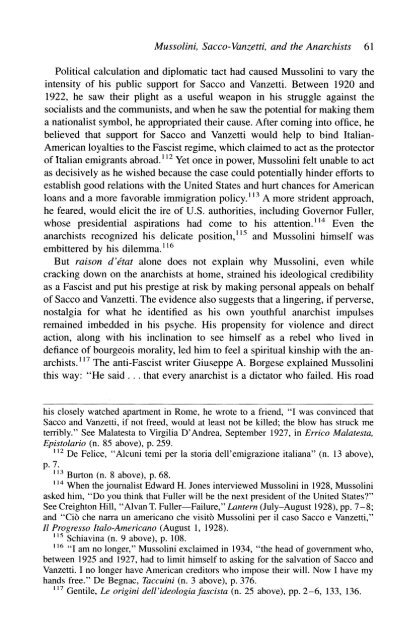Mussolini, Sacco-Vanzetti, and the Anarchists: The ... - Libcom
Mussolini, Sacco-Vanzetti, and the Anarchists: The ... - Libcom
Mussolini, Sacco-Vanzetti, and the Anarchists: The ... - Libcom
You also want an ePaper? Increase the reach of your titles
YUMPU automatically turns print PDFs into web optimized ePapers that Google loves.
<strong>Mussolini</strong>, <strong>Sacco</strong>-<strong>Vanzetti</strong>, <strong>and</strong> <strong>the</strong> <strong>Anarchists</strong> 61<br />
Political calculation <strong>and</strong> diplomatic tact had caused <strong>Mussolini</strong> to vary <strong>the</strong><br />
intensity of his public support for <strong>Sacco</strong> <strong>and</strong> <strong>Vanzetti</strong>. Between 1920 <strong>and</strong><br />
1922, he saw <strong>the</strong>ir plight as a useful weapon in his struggle against <strong>the</strong><br />
socialists <strong>and</strong> <strong>the</strong> communists, <strong>and</strong> when he saw <strong>the</strong> potential for making <strong>the</strong>m<br />
a nationalist symbol, he appropriated <strong>the</strong>ir cause. After coming into office, he<br />
believed that support for <strong>Sacco</strong> <strong>and</strong> <strong>Vanzetti</strong> would help to bind Italian-<br />
American loyalties to <strong>the</strong> Fascist regime, which claimed to act as <strong>the</strong> protector<br />
of Italian emigrants abroad.' 12 Yet once in power, <strong>Mussolini</strong> felt unable to act<br />
as decisively as he wished because <strong>the</strong> case could potentially hinder efforts to<br />
establish good relations with <strong>the</strong> United States <strong>and</strong> hurt chances for American<br />
loans <strong>and</strong> a more favorable immigration policy. 13 A more strident approach,<br />
he feared, would elicit <strong>the</strong> ire of U.S. authorities, including Governor Fuller,<br />
whose presidential aspirations had come to his attention." 14 Even <strong>the</strong><br />
anarchists recognized his delicate position,"15 <strong>and</strong> <strong>Mussolini</strong> himself was<br />
embittered by his dilemma."16<br />
But raison d'etat alone does not explain why <strong>Mussolini</strong>, even while<br />
cracking down on <strong>the</strong> anarchists at home, strained his ideological credibility<br />
as a Fascist <strong>and</strong> put his prestige at risk by making personal appeals on behalf<br />
of <strong>Sacco</strong> <strong>and</strong> <strong>Vanzetti</strong>. <strong>The</strong> evidence also suggests that a lingering, if perverse,<br />
nostalgia for what he identified as his own youthful anarchist impulses<br />
remained imbedded in his psyche. His propensity for violence <strong>and</strong> direct<br />
action, along with his inclination to see himself as a rebel who lived in<br />
defiance of bourgeois morality, led him to feel a spiritual kinship with <strong>the</strong> anarchists.l17<br />
<strong>The</strong> anti-Fascist writer Giuseppe A. Borgese explained <strong>Mussolini</strong><br />
this way: "He said. . . that every anarchist is a dictator who failed. His road<br />
his closely watched apartment in Rome, he wrote to a friend, "I was convinced that<br />
<strong>Sacco</strong> <strong>and</strong> <strong>Vanzetti</strong>, if not freed, would at least not be killed; <strong>the</strong> blow has struck me<br />
terribly." See Malatesta to Virgilia D'Andrea, September 1927, in Errico Malatesta,<br />
Epistolario (n. 85 above), p. 259.<br />
112 De Felice, "Alcuni temi per la storia dell'emigrazione italiana" (n. 13 above),<br />
p.7.<br />
113 Burton (n. 8 above), p. 68.<br />
"14 When <strong>the</strong> journalist Edward H. Jones interviewed <strong>Mussolini</strong> in 1928, <strong>Mussolini</strong><br />
asked him, "Do you think that Fuller will be <strong>the</strong> next president of <strong>the</strong> United States?"<br />
See Creighton Hill, "Alvan T. Fuller-Failure," Lantern (July-August 1928), pp. 7-8;<br />
<strong>and</strong> "Cio che narra un americano che visit6 <strong>Mussolini</strong> per il caso <strong>Sacco</strong> e <strong>Vanzetti</strong>,"<br />
In Progresso Italo-Americano (August 1, 1928).<br />
115 Schiavina (n. 9 above), p. 108.<br />
116 "I am no longer," <strong>Mussolini</strong> exclaimed in 1934, "<strong>the</strong> head of government who,<br />
between 1925 <strong>and</strong> 1927, had to limit himself to asking for <strong>the</strong> salvation of <strong>Sacco</strong> <strong>and</strong><br />
<strong>Vanzetti</strong>. I no longer have American creditors who impose <strong>the</strong>ir will. Now I have my<br />
h<strong>and</strong>s free." De Begnac, Taccuini (n. 3 above), p. 376.<br />
117<br />
Gentile, Le origini dell'ideologia fascista (n. 25 above), pp. 2-6, 133, 136.

















